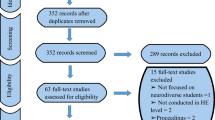Abstract
Addressing the needs of students with dyslexia requires an in-depth knowledge of various components of a multi-dimensional approach to reading intervention, which is supported by an understanding of the structure of the language being taught. The current study explored the association between teacher knowledge of the English language and different stages of training provided through 2-year courses that meet the objectives of the International Dyslexia Association (IDA) standards of teacher knowledge and practice. It included 347 K-12 licensed teachers who were at various stages of training when they completed a test of knowledge in the areas of Phonological Sensitivity, Phonemic Awareness, Decoding, Spelling, and Morphology. The level of terminal degree (i.e., BA or MA) held by participating teachers and their amount of teaching experience did not predict performance on the test. In contrast, participating teachers differed in their level of knowledge as a function of how much training they had received as part of a 2-year course. Increased training was associated with elevated levels of knowledge. Moreover, teachers who completed the 2-year training program and went on to obtain certification through a national certifying organization had reliably greater knowledge than those who had not. Additionally, the weakest domains of knowledge across all teachers were in spelling and morphology, suggesting a need for improved training in these domains, given that they are identified deficiencies for persistently poor responders to reading intervention and in children presenting with late emerging forms of reading disability.

Similar content being viewed by others
References
Binks-Cantrell, E., Joshi, M., & Washburn, E. (2012a). Validation of an instrument for assessing teacher knowledge of basic language constructs of literacy. Annals of Dyslexia, 62, 153–171. https://doi.org/10.1007/s11881-012-0070-8.
Binks-Cantrell, E., Washburn, E., Joshi, M., & Hougen, M. (2012b). Peter effect in the preparation of reading teachers. Scientific Studies of Reading, 16, 526–536. https://doi.org/10.1080/10888438.2011.601434.
Bos, C., Mather, N., Dickson, S., Podhajski, B., & Chard, D. (2001). Perceptions and knowledge of preservice and inservice educators about early reading instruction. Annals of Dyslexia, 51, 97–107.
Carlisle, J., Kelcey, B., Rowan, B., & Phelps, G. (2011). Teachers’ knowledge about early reading: Effects on students’ gains in reading achievement. Journal of Research on Educational Effectiveness, 4, 289–321.
Carreker, S., Joshi, M., & Boulware-Gooden, R. (2010). Spelling related teacher knowledge: The impact of professional development on identifying appropriate instructional practices. Learning Disability Quarterly, 33, 148–158.
Carreker, S., Neuhaus, G., Swank, P., Johnson, P., Monfils, M., & Montemayor, M. (2007). Teachers with linguistically informed knowledge of reading subskills are associated with a Matthew effect in reading comprehension for monolingual and bilingual students. Reading Psychology, 28, 187–212. https://doi.org/10.1080/02702710601186456.
Castles, A., Rastle, K., & Nation, K. (2018). Ending the reading wars: Reading acquisition from novice to expert. Psychological Science in the Public Interest, 19, 5–51. https://doi.org/10.1177/1529100618772271.
Cohen, R., Mather, N., Schneider, D., & White, J. (2017). A comparison of schools: Teacher knowledge of explicit code-based reading instruction. Reading and Writing, 30, 653–690. https://doi.org/10.1007/s11145-016-9694-0.
Cunningham, A., Perry, K., Stanovich, K., & Stanovich, P. (2004). Disciplinary knowledge of K-3 teachers and their knowledge calibration in the domain of early literacy. Annals of Dyslexia, 54, 139–167. https://doi.org/10.1007/s11881-004-007-y.
Ehri, L. (1999). Phases of development in learning to read words. In J. Oakhill & R. Beard (Eds.), Reading, development and the teaching of reading: A psychological perspective (pp. 79–108). Oxford, England: Blackwell Science.
Ehri, L., & Flugman, B. (2018). Mentoring teachers in systematic phonics instruction: Effectiveness of an intensive year-long program for kindergarten through 3rd grade teachers and their students. Reading and Writing, 31, 425–456. https://doi.org/10.1007/s11145-017-9797-7.
Ehri, L., & McCormick, S. (1998). Phases of word learning: Implications for instruction with delayed and disabled readers. Reading and Writing Quarterly, 14(2), 135–163. https://doi.org/10.1080/1057356980140202.
Folsom, J., Smith, K., Burk, K., & Oakley, N. (2017). Educator outcomes associated with implementation of Mississippi’s K-3 early literacy professional development initiative. (REL 2017-270), Washington, DC: U.S. Department of Education, Institute of Education Sciences, National Center for Education Evaluation and Regional Assistance, Regional Educational Laboratory Southeast. Retrieved from http://ies.ed.gov/ncee/edlabs. Accessed 26 Nov 2017.
Foorman, B., Beyler, N., Borradaile, K., Coyne, M., Denton, C., Dimino, J., Furgeson, J., Hayes, L., Henke, J., Justice, L., Keating, B., Lewis, W., Sattar, S., Streke, A., Wagner, R., & Wissel, S. (2016). Foundational skills to support reading for understanding in kindergarten through 3rd grade (NCEE 2016-4008). Washington, DC: National Center for education evaluation and regional assistance (NCEE), Institute of Education Sciences, U.S. Department of Education Retrieved from the NCEE website: http://whatworks.ed.gov. Accessed 16 Nov 2016.
Foorman, B., & Moats, L. (2004). Conditions for sustaining research-based practices in early reading instruction. Remedial and Special Education, 25, 51–60.
Gersten, R., Compton, D., Connor, C., Dimino, J., Santoro, L., Linan-Thompson, S., & Tilly, W.. (2008). Assisting students struggling with reading: Response to intervention and multi-tier intervention for reading in the primary grades. A practice guide. (NCEE 2009-4045). Washington, DC: National Center for Education Evaluation and Regional Assistance, Institute of Education Sciences, U.S. Department of Education. Retrieved from http://ies.ed.gov/ncee/wwc/publications/practiceguides/. Accessed 16 Nov 2016.
International Dyslexia Association. (2018). Knowledge and practice standards for teachers of reading. Retrieved from International Dyslexia Association website: https://app.box.com/s/21gdk2k1p3bnagdfz1xy0v98j5ytl1wk. Accessed 15 May 2018.
Joshi, R., Binks, E., Hougen, M., Dahlgren, M., Ocker-Dean, E., & Smith, D. (2009). Why elementary teachers might be inadequately prepared to teach reading. Journal of Learning Disabilities, 42, 392–402. https://doi.org/10.1177/0022219409338736.
Kessler, B., & Treiman, R. (2001). Relationships between sounds and letters in English monosyllables. Journal of Memory and Language, 44(4), 592–617. https://doi.org/10.1006/jmla.2000.2745.
Lyon, R., & Weiser, B. (2009). Teacher knowledge, instructional expertise, and the development of reading proficiency. Journal of Learning Disabilities, 42, 475–480. https://doi.org/10.1177/0022219409338741.
McCutchen, D., & Berninger, V. (1999). Those who know, teach well: Helping teachers master literacy-related subject-matter knowledge. Learning Disabilities Research & Practice, 14, 215–226. https://doi.org/10.1207/sldrp1404_3
McCutchen, D., Abbott, R., Green, L., Beretvas, S., Cox, S., Potter, N., & Gray, A. (2002). Beginning literacy: Links among teacher knowledge, teacher practice, and student learning. Journal of Learning Disabilities, 35(1), 69–86.
McCutchen, D., Green, L., Abbott, R., & Sanders, E. (2009). Further evidence for teacher knowledge: Supporting struggling readers in grades three through five. Reading and Writing, 22, 401–423. https://doi.org/10.1007/s11145-009-9163-0.
Moats, L. (1994). Missing foundation in teacher education: Knowledge of the structure of spoken and written language. Annals of Dyslexia, 44, 81–102.
Moats, L. (2009). Knowledge foundations for teaching reading and spelling. Reading And Writing, 22, 379–399. https://doi.org/10.1007/s11145-009-9162-1
Moats, L., Carreker, S., Davis, R., Meisel, P., Spear-Swerling, L., & Wilson, B. (2010). Knowledge and practice standards for teachers of reading. Retrieved from International Dyslexia Association website: https://app.box.com/s/ex1psv12zdq61vz7j4b6rsln7zsgtxii. Accessed 3 June 2015.
Moats, L., & Foorman, B. (2003). Measuring teachers’ content knowledge of language and reading. Annals of Dyslexia, 53, 23–45. https://doi.org/10.1007/s11881-003-0003-7.
Moats, L., & Lyon, G. (1996). Wanted: Teachers with knowledge of language. Topics in Language Disorders, 16, 73–86. https://doi.org/10.1097/00011363-199602000-00007.
National Reading Panel. (2009). Teaching children to read: An evidenced based assessment of the scientific literature on reading and its implications for reading instruction. Bethesda, MD: National Reading Panel, National Institute of Child Health and Human Development.
Perfetti, C. (1992). The representation problem in reading acquisition. In P. B. Gough, L. C. Ehri, & R. Treiman (Eds.), Reading acquisition (pp. 145–174). Hillsdale, NJ: Erlbaum.
Piasta, S., Connor, C., Fishman, B., & Morrison, F. (2009). Teachers’ knowledge of literacy concepts, classroom practices, and student reading growth. Scientific Studies of Reading, 13, 224–248. https://doi.org/10.1080/10888430902851364.
Podhajski, B., Mather, N., Nathan, J., & Sammons, J. (2009). Professional development in scientifically based reading instruction: Teacher knowledge and reading outcomes. Journal of Learning Disabilities, 42, 403–417. https://doi.org/10.1177/0022219409338737.
Rastle, K. (2018). The place of morphology in learning to read. Cortex. https://doi.org/10.1016/j.cortex.2018.02.008.
Share, D. L., & Stanovich, K. E. (1995). Cognitive processes in early reading development: Accommodating individual differences into a model of acquisition. Issues in Education: Contributions from Educational Psychology, 1–57.
Spear-Swerling, L., & Brucker, P. (2003). Teachers’ acquisition of knowledge about English word structure. Annals of Dyslexia, 53, 72–96. https://doi.org/10.1007/s11881-003-0005-5.
Stark, H., Snow, P., Eadie, P., & Goldfeld, S. (2016). Language and reading instruction in early years’ classrooms: The knowledge and self-rated ability of Australian teachers. Annals of Dyslexia, 66, 28–54. https://doi.org/10.1007/s11881-015-0112-0.
Author information
Authors and Affiliations
Corresponding author
Additional information
Publisher’s note
Springer Nature remains neutral with regard to jurisdictional claims in published maps and institutional affiliations.
Rights and permissions
About this article
Cite this article
McMahan, K.M., Oslund, E.L. & Odegard, T.N. Characterizing the knowledge of educators receiving training in systematic literacy instruction. Ann. of Dyslexia 69, 21–33 (2019). https://doi.org/10.1007/s11881-018-00174-2
Published:
Issue Date:
DOI: https://doi.org/10.1007/s11881-018-00174-2




